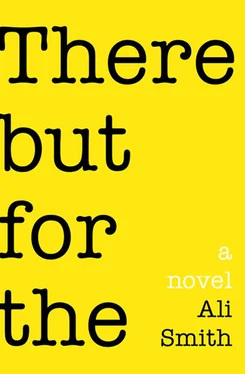Well, you’ve upped the stakes, Bernice, Jan says. Nobody’s ever mentioned Milton at one of our dinner parties before. Esoteric, is that the word for it, Hugo?
It’s also for helping memory, the father says to the child, since it’s much easier to memorize something that rhymes.
Well I know that, I mean, duh, the child says. Obviously.
Don’t say duh, Bernice says. Do say obviously.
Mark laughs. Bernice shoots him a glad look, a little secret handshake in a room full of strangers — which is what this room is, for Mark too, a room full of strangers except for Hugo, who, though he isn’t one, is doing his best to act like one.
And not just memory, Terence is saying, but it also makes people feel safe, comforted, because when things rhyme it reminds them of their childhoods, and over and above that it’s also like rhyme is saying, hey, things are good, they’re all right, they’re in some kind of harmony, they may even be funny.
You are lecturing me, the child says. I resist all attempts at lecturing and indoctrination.
Terence turns, shrugs his shoulders at Mark and Miles and Bernice.
Damn, he says. Another self-made freethinker.
And when I look back on this evening in a week and a month and a year and a day, I will remember every single thing about it, the child says.
No you won’t, her father says.
I will, actually, the child says.
Physiologically impossible, Brooksie, her father says.
Yes, but you can’t tell me what I’ll remember and what I’ll forget, the child says.
That’s true, Bernice says. But. The whole point is, we can forget. It’s important that we forget some things. Otherwise we’d go round the world carrying a hodload of stuff we just don’t need.
In any case I intend to remember it all, the child says. I shall therefore go out of my way to do this particular thing.
Terence takes her by the collar, pulls her back, picks her up, swings her into the air and sits her on his knee.
That’s a different matter, Brooksie, he says. Memorizing is conceptually and physiologically different from remembering.
Duh, the child says.
She gives the word her most intelligent inflection.
Brooke, her mother says.
Obviously, the child says.
She says it as though it means duh.
The conversation about rhyme and memory has arisen because a moment ago Mark asked the child what books she likes reading. Mark is usually more uneasy around children, who always make him feel like his best behaviour isn’t quite good enough, because they are so true, like little truth detectives. But this child is a charming and quite unthreatening one. Have you ever read Struwwelpeter? he’d asked her. The story of Augustus who would not eat any soup? Or A Book of Nonsense? Have you ever read Edward Lear’s limericks? There was a young lady of Norway. Who casually sat in a doorway.
Then while the child and the others have this conversation, Mark sits in amazement as his own mind unfurls and one after the other like little falling-open scrolls he finds line after rhyming line inside his head. Augustus was a chubby lad. Fat ruddy cheeks Augustus had. When the door squeezed her flat she replied, what of that? That courageous young lady of Norway.
My head is full of poems from fifty years ago, things I haven’t thought for years and didn’t even know I still knew, he says to Miles.
’Twas brillig, and the slithy toves, Miles says sitting down across from him.
I know that one, Hugo’s wife Caroline says. Hello Mark. I’m glad they’ve put me next to you.
Did google twitter in the blog, Miles says.
Yes, Caroline says. It’s amazing, isn’t it, how very visionary he was. Imagine inventing all those words, words we use every day now. Brilliant.
She holds her full glass of white up for clinking.
To you, she says. And to — Miles, was it?
It was and is, Miles says.
I’m glad. How long have you two been together? she says.
About three and a half hours last Saturday and (glancing down at his watch) twenty minutes tonight, Miles says. Oh no, we stayed and had a drink last Saturday too. Four and a half.
We’re not actually what you’d call together, Mark says.
Oh, she says.
She puts down her glass. She looks a little affronted.
Everybody is sitting down now except the woman whose house it is, Jan. Mark goes round the table naming everybody to himself. Start with Caroline on his right, then Hugo, uh, Hannah the blonde, then Miles. Then, is it Eric, the grey man? then Bernice, then the child, then the space where Jan will sit, then Terence, then directly on Mark’s left what’s his name, reedy man, microdrone, Richard.
Richard is the person Mark most hoped he wouldn’t be put beside, apart from Caroline obviously (duh). Through in the sitting room, all through drinks, Richard had talked about his job.
Well, it’s police we’re doing the main selling to at the moment, he said. Though we’re pretty much open to bona fide offers from anywhere.
Loves his work, Rich, Hugo said.
What’s not to love? This thing markets itself, Richard said. Hardly like work at all.
What’s a microdrone? Bernice had said.
Richard then described the versatile smallness, the engine size, the battery voltage, the weight that means they’re not illegal and don’t need clearance from Civil Aviation, the adaptability, the camera type, the HD quality, the facial recognition range (fifty-five yard), the mph (fifteen, in this particular model, though others are even more phenomenally nippy), the flying range (five hundred yard), the flying time (thirty-minute, we’re working on that), the relative silence, the way they can be operated from inside a van or even in some cases from home, the training time (fifteen-minute) involved for the first-time user, and the way that even if some yob wings them with an air rifle they’ll still function pretty well all said and done.
What he hasn’t said is how cute they are, Richard’s partner Hannah said. I want one for our boys. Like little toys.
Actually classed as toys, Richard said. Which is why they don’t need clearance. Fantastic for football matches, protest meetings, you name it.
And then there’s Project Anubis, eh, Rich? Hugo said.
Yes, Richard said, well, no point in being naïve about it, it’s a nasty old world out there and it strikes me all sensible people will feel the same way as I do about it and if they don’t they ought to. And what I always say is, what a relief it’ll be when it comes to conflict, combat, and it’s robots who’ll do the work and so on. Efficiency is one fantastic thing, but the psychological liberation is a whole other massively important knock-on effect. To kill without actually having to. Hand to hand combat, gone in the wink of an eye.
I don’t understand, Terence said.
I always think when we have this conversation, and we have it every time we all have supper together, Hugo said, that it’d be a lot more useful if our great minds were put to the task of sorting our genetics out. I’m only forty-five but I’m telling you, it’s making me think, being forty-five.
Well, as long as something’s making you think, Bernice said.
Touché, Hugo said.
Project what did you call it? Bernice said. Anubis?
Yeah, Anubis, it’s just one of several levels of drone development, Richard said. Obviously the targeting specificity has been in development all along, alongside the surveillance aspect, and drones are already used widely in conflict situations. But right now we’re emphasizing the surveillance aspect for the domestic market.
Project Anubis, Terence said.
Anubis is the ancient Egyptian god of the dead, Bernice said.
Is it? Richard said. Ah. Right.
Читать дальше












